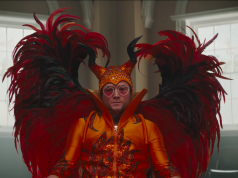I devoutly believe Stephen Sondheim is the greatest songwriter in the history of musical theater (note I do not say “most hummable”), and “Sweeney Todd: The Demon Barber of Fleet Street” is one of his best works, a darkly comic and truly horrifying tale. Yet though I’ve seen some great live productions of it, I’ve never seen the show’s rich themes brought to life as vividly as in Tim Burton’s new film version.
Burton nails it, starting with the casting (Johnny Depp as Sweeney? Helena Bonham Carter as Mrs. Lovett? Perfect!) and continuing with the cold, desaturated colors of Dariusz Wolski’s cinematography and the fantasy-nightmare version of 19th-century London as reconstructed by production designer Dante Ferretti and set decorator Francesca Lo Schiavo. Heck, let’s mention Colleen Atwood’s deliciously grimy costumes and the hair and makeup staff, too! When Mrs. Lovett has a sunny daydream about her and Sweeney relaxing on the seashore, their pale, powdery faces make them look more ghoulish than usual — a subtle reminder that they do not belong in a place so cheerful. They belong in hell.
But look at me, talking about sets and costumes as though I were writing a theater review! Burton’s version is not theatrical; it is cinematic through and through, with swooping cameras and color schemes that would be impossible to create in a live setting. And while a live production is limited by logistics and good taste in how much fake blood it can use when the demon barber slits his customers’ throats, Burton goes all out. You think “Sweeney Todd” is a bloody story? You have no idea. At least a dozen people meet their maker in that fashion, and Burton shows us every single one of them, never bothering to cut away discreetly or merely hint at the gore involved. His goal is to horrify us not just with the idea of Sweeney’s deeds but with the actual sight of them.
John Logan’s screen adaptation is very faithful to the stage version (songs by Sondheim, dialogue by regular collaborator Hugh Wheeler), with no changes to the plot and only a few musical numbers trimmed or omitted. Sweeney Todd is the name assumed by Benjamin Barker, once a happy London barber with a wife and baby daughter but now a hardened, bitter man. It seems the evil Judge Turpin (Alan Rickman) coveted Barker’s wife and trumped up some false charges to get Barker shipped off to prison. Now, 15 years later, Barker’s wife is dead and his little girl Johanna (Jayne Wisener) is a ward of the judge, who keeps her locked away and plans to marry her himself.
Sweeney wants revenge on the judge and on the Beadle Bamford (Timothy Spall), the slobbering lackey who does Turpin’s bidding, and if he can get them into a barber’s chair, he can use his razors to do the job. He finds his old barbershop has a new downstairs neighbor in the filthy Mrs. Lovett, who sells meat pies that are, by her own admission, the worst in London. Meat is hard to come by, and while her competition is rumored to use the neighborhood pussycats, Mrs. Lovett would never stoop to such — well, OK, the cats are just too fast for her to catch.
She recognizes Sweeney for who he really is and fills him in on what happened to his beloved wife and daughter, barely hiding her own budding affection for him. Sweeney is too focused on revenge to notice. He soon realizes that once you decide you’re capable of murder, you find there are a lot of people who deserve it. He has to bide his time until the judge visits his barbershop, so hey, maybe every man in stinking, rotten London deserves to have his throat slit in the meantime. Or every man in London who won’t be missed, anyway. (You can’t go killing a guy whose wife knows where he went and expects him home soon.) Lucky for Sweeney, Mrs. Lovett has a swell idea for disposing of the bodies that pile up. Soon her meat pies are the most popular in town!
There is devilish humor in all this, of course. Burton knows better than anyone how to dance merrily on the line between the macabre and the disgusting, and Depp and Carter are truly inspired choices to play the leads. What two actors are better at playing funny, bizarre lunatics?
It should not escape the viewer’s notice that Sweeney is ultimately no better than the evil judge he so reasonably wants to destroy. Both are consumed by their own selfish desires — Sweeney for revenge, Turpin for Johanna — and both demonstrate a cold indifference to human life. In a throwaway joke new for the movie, we see Turpin sentence a little boy to death at the gallows. It’s a bit of morbid humor, but it also parallels something we saw earlier, when Sweeney was willing to kill Toby (Ed Sanders), the young boy who works for Mrs. Lovett.
The story is ultimately about unfulfilled desires. Sweeney wants to avenge his wife and daughter, which he can never truly do. Mrs. Lovett wants Sweeney for a husband. Toby wants Mrs. Lovett to be his mother. Judge Turpin wants Johanna, and so does Anthony (Jamie Campbell Bower), a young sailor who sees her singing in her upstairs window. Tim Burton swirls all of this into a fantastically haunting tale, a nightmare musical of cannibalism and revenge that’s gripping from the first minor chord on the organ to the bloody, inevitable resolution.
A (1 hr., 57 min.; )





